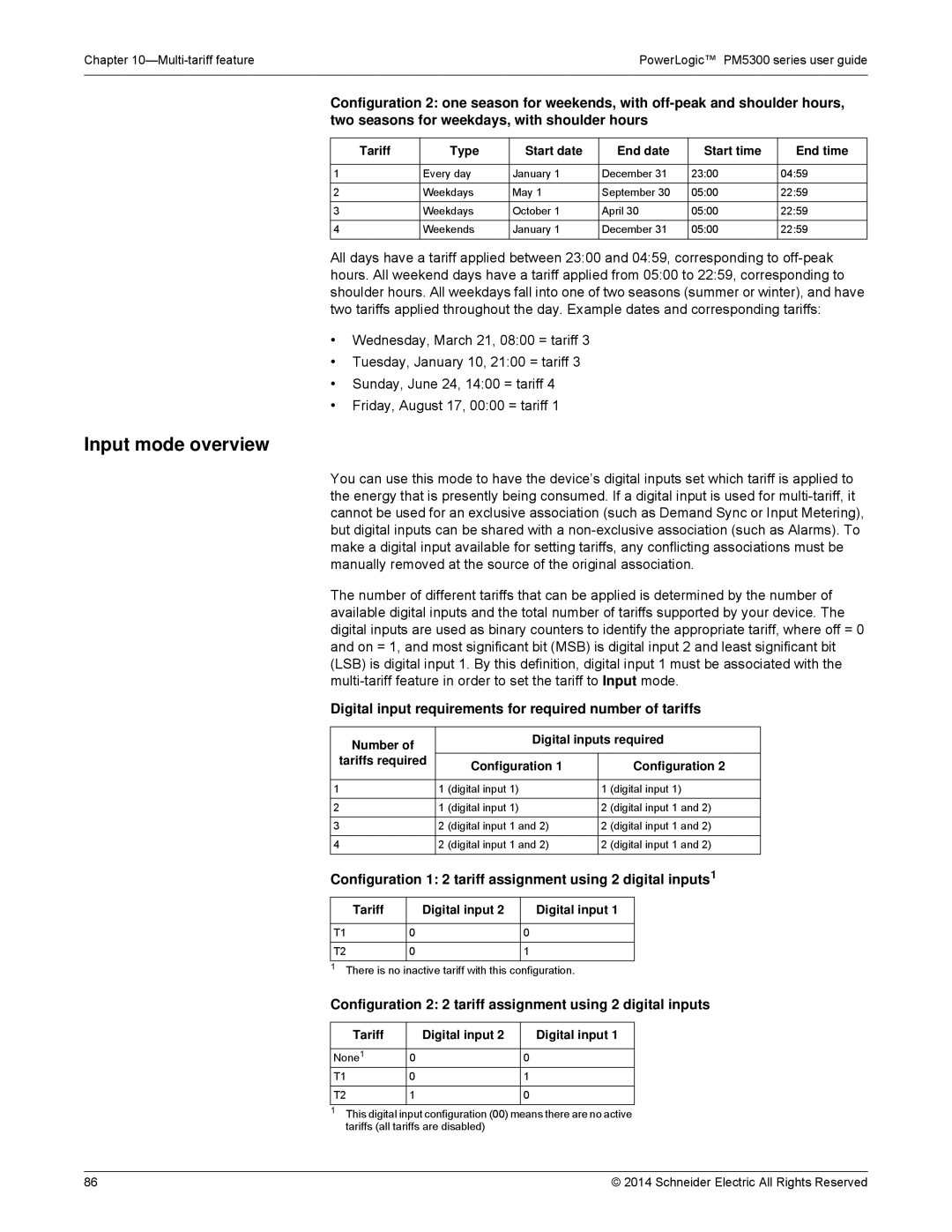
Chapter
Configuration 2: one season for weekends, with
Tariff | Type | Start date | End date | Start time | End time |
|
|
|
|
|
|
1 | Every day | January 1 | December 31 | 23:00 | 04:59 |
|
|
|
|
|
|
2 | Weekdays | May 1 | September 30 | 05:00 | 22:59 |
|
|
|
|
|
|
3 | Weekdays | October 1 | April 30 | 05:00 | 22:59 |
|
|
|
|
|
|
4 | Weekends | January 1 | December 31 | 05:00 | 22:59 |
|
|
|
|
|
|
All days have a tariff applied between 23:00 and 04:59, corresponding to
•Wednesday, March 21, 08:00 = tariff 3
•Tuesday, January 10, 21:00 = tariff 3
•Sunday, June 24, 14:00 = tariff 4
•Friday, August 17, 00:00 = tariff 1
Input mode overview
You can use this mode to have the device’s digital inputs set which tariff is applied to the energy that is presently being consumed. If a digital input is used for
The number of different tariffs that can be applied is determined by the number of available digital inputs and the total number of tariffs supported by your device. The digital inputs are used as binary counters to identify the appropriate tariff, where off = 0 and on = 1, and most significant bit (MSB) is digital input 2 and least significant bit (LSB) is digital input 1. By this definition, digital input 1 must be associated with the
Digital input requirements for required number of tariffs
Number of |
| Digital inputs required | ||
|
|
|
| |
tariffs required |
| Configuration 1 |
| Configuration 2 |
|
|
| ||
|
|
|
|
|
1 | 1 | (digital input 1) | 1 | (digital input 1) |
|
|
|
|
|
2 | 1 | (digital input 1) | 2 | (digital input 1 and 2) |
|
|
|
|
|
3 | 2 | (digital input 1 and 2) | 2 | (digital input 1 and 2) |
|
|
|
|
|
4 | 2 | (digital input 1 and 2) | 2 | (digital input 1 and 2) |
|
|
|
|
|
Configuration 1: 2 tariff assignment using 2 digital inputs1
| Tariff | Digital input 2 | Digital input 1 |
|
|
|
|
T1 | 0 |
| 0 |
|
|
|
|
T2 | 0 |
| 1 |
1There is no inactive tariff with this configuration.
Configuration 2: 2 tariff assignment using 2 digital inputs
Tariff |
| Digital input 2 | Digital input 1 |
|
|
|
|
None1 | 0 |
| 0 |
T1 | 0 |
| 1 |
|
|
|
|
T2 | 1 |
| 0 |
1This digital input configuration (00) means there are no active tariffs (all tariffs are disabled)
86 | © 2014 Schneider Electric All Rights Reserved |
